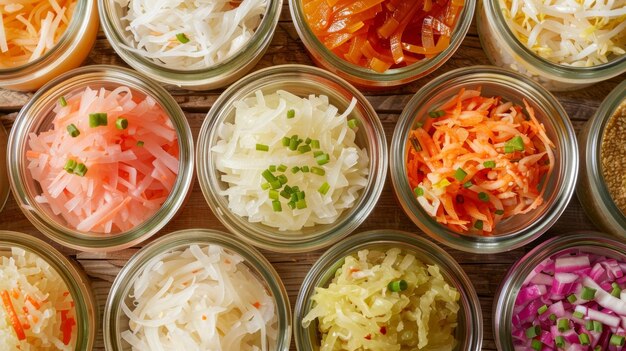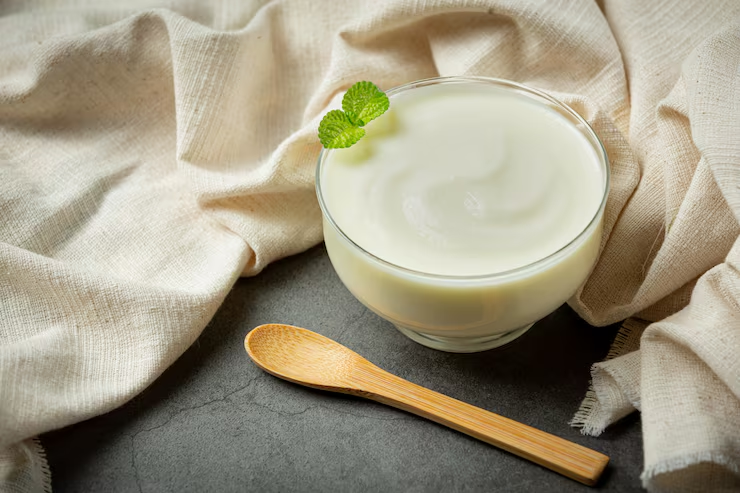Maintaining a healthy gut is more crucial than ever in today’s fast-paced lifestyle. Our gut not only influences digestion but also affects immunity, mood, and overall well-being. One of the most effective ways to boost gut health is through the consumption of fermented foods for gut health. These foods are rich in probiotics, which are beneficial bacteria that promote a balanced gut microbiome. Incorporating fermented foods into your daily diet can improve digestion, enhance nutrient absorption, and even support mental health. Whether you are struggling with bloating, irregular bowel movements, or low energy, fermented foods can provide natural solutions that are both safe and effective. 🌟
Fermentation is a natural process where microorganisms like bacteria and yeast break down sugars in food, creating organic acids and beneficial enzymes. This process not only preserves food but also increases its nutritional value. Fermented foods for gut health include a variety of items such as yogurt, kimchi, kefir, sauerkraut, and kombucha. Each of these foods provides unique strains of probiotics that can improve the diversity of your gut microbiota. The more diverse your gut bacteria are, the better your body can handle digestion, fight infections, and regulate inflammation. 🥗
Modern diets often lack the natural probiotics necessary for gut balance. Processed foods, antibiotics, and high sugar consumption can disrupt gut flora, leading to digestive discomfort and other health issues. By introducing fermented foods for gut health, you can restore this balance naturally. These foods not only support physical health but also enhance mental clarity and emotional well-being by producing neurotransmitters like serotonin in the gut. In short, fermented foods are not just a trend—they are a scientifically proven way to nurture your body from within.

What Are Fermented Foods for Gut Health?
Fermented foods for gut health are foods that have undergone a natural fermentation process. During fermentation, bacteria, yeast, or other microorganisms convert sugars and starches into acids or alcohol, which act as natural preservatives. This process creates a variety of health benefits, particularly for the gut. Fermented foods are rich in probiotics, which are live microorganisms that, when consumed in adequate amounts, confer health benefits to the host. Probiotics support the balance of good bacteria in the digestive system, improving digestion and nutrient absorption.
Common examples of fermented foods for gut health include yogurt, kefir, kimchi, sauerkraut, miso, tempeh, and kombucha. Yogurt, for instance, contains strains of Lactobacillus and Bifidobacterium that enhance digestion and help combat bloating. Kimchi, a traditional Korean dish made from fermented vegetables, is packed with beneficial bacteria and vitamins that support immune health. Sauerkraut, made from fermented cabbage, contains enzymes and antioxidants that can reduce inflammation and promote gut balance. Each fermented food brings a unique combination of probiotics and nutrients, offering multiple benefits to overall wellness. 🥬
Fermented foods also improve the bioavailability of nutrients in your diet. For example, fermentation can increase vitamin content, break down anti-nutrients, and enhance mineral absorption. This makes fermented foods for gut health an excellent addition to your daily meals. Regular consumption can prevent digestive issues, boost immunity, and even support weight management. Fermented foods are easy to integrate into any diet—whether you prefer plant-based options like tempeh or animal-based options like kefir—making them versatile and accessible for everyone seeking better gut health.
Why Fermented Foods for Gut Health Are Essential
The gut plays a central role in overall health, and maintaining its balance is vital. Fermented foods for gut health help replenish beneficial bacteria in the gut microbiome, which can be disrupted by poor diet, stress, or medication. A balanced gut improves digestion, reduces bloating, supports the immune system, and even positively affects mental health. Probiotics in fermented foods interact with the gut lining to produce essential short-chain fatty acids that nourish gut cells, reduce inflammation, and protect against harmful pathogens. 🧬
In addition to digestive benefits, fermented foods for gut health can enhance nutrient absorption. Certain vitamins like B12, K2, and folate are better synthesized in the presence of probiotics, improving overall nutrient utilization. Fermented foods also produce bioactive compounds and enzymes that help break down complex foods, reducing digestive discomfort and optimizing energy levels. Individuals who regularly consume fermented foods often report better regularity, reduced constipation, and lower rates of gastrointestinal disorders.
Mental well-being is another remarkable benefit of consuming fermented foods. The gut-brain connection means that a healthy microbiome can improve mood, reduce anxiety, and enhance cognitive function. Fermented foods stimulate the production of neurotransmitters such as serotonin and gamma-aminobutyric acid (GABA), which regulate mood and mental clarity. By including fermented foods for gut health in your diet, you not only improve physical health but also emotional and cognitive resilience, making them an essential component of holistic wellness. 🌸
Key Fermented Foods for Gut Health and Their Benefits
Yogurt

Yogurt is one of the most popular fermented foods for gut health. It is rich in beneficial bacteria like Lactobacillus and Bifidobacterium, which help maintain a balanced gut microbiome. Regular consumption supports digestion, reduces bloating, and prevents irregular bowel movements. Yogurt is also packed with calcium, protein, and essential vitamins, promoting strong bones, muscles, and overall health. It is versatile and can be enjoyed at breakfast with fruits and nuts, as a snack, or incorporated into savory dishes. Greek yogurt offers higher protein, while traditional yogurt provides more probiotics. For people with mild lactose intolerance, yogurt is easier to digest than milk because fermentation reduces lactose content. Including yogurt in your diet ensures your gut receives a daily dose of beneficial bacteria while providing essential nutrients. Consuming yogurt regularly is an easy and delicious way to reap the benefits of fermented foods for gut health. 🍶
Kefir
Kefir is a nutrient-dense beverage and a powerful example of fermented foods for gut health. It contains 30–40 strains of beneficial bacteria and yeast, making it more potent than regular yogurt in supporting digestion. Kefir promotes healthy bowel movements, reduces bloating, and enhances nutrient absorption. It can also improve lactose tolerance and strengthen the immune system. Rich in vitamins B12, K2, and minerals like calcium and magnesium, kefir contributes to bone health and overall wellness. Its slightly tangy, effervescent flavor makes it enjoyable on its own or in smoothies, dressings, and desserts. Regular consumption helps restore gut flora, reduce inflammation, and maintain digestive balance. By incorporating kefir into your diet, you gain a versatile and delicious fermented food for gut health that nourishes both your digestive system and your overall health. 🥛
Sauerkraut
Sauerkraut, made from naturally fermented cabbage, is a top choice among fermented foods for gut health. It is rich in probiotics and digestive enzymes that improve gut function, regulate bowel movements, and reduce bloating. Sauerkraut also contains antioxidants, vitamin C, vitamin K, and fiber, which strengthen immunity and support overall health. The fermentation process enhances nutrient absorption, making vitamins and minerals more bioavailable. Including sauerkraut in meals can reduce inflammation and protect against harmful bacteria. Its tangy flavor makes it a versatile addition to sandwiches, salads, and main dishes. Low in calories but nutrient-dense, sauerkraut is ideal for enhancing both gut and overall health. Regular consumption ensures a steady supply of beneficial bacteria to your digestive system. Adding this probiotic-rich food to your diet is a delicious way to benefit from fermented foods for gut health while adding flavor and nutrition to your meals. 🥬
Kimchi

Kimchi is a traditional Korean dish made from fermented vegetables, primarily cabbage and radishes, and is one of the best fermented foods for gut health. It contains probiotics that support a balanced gut microbiome, improve digestion, and enhance nutrient absorption. Kimchi is also rich in vitamins A, C, and K, minerals like calcium and iron, and antioxidants that strengthen immunity and reduce inflammation. Including kimchi in your diet can aid digestive health, protect against harmful bacteria, and promote overall wellness. Its bold, tangy, and slightly spicy flavor adds excitement to meals and can be used as a side dish, in stir-fries, or in soups and sandwiches. By regularly consuming kimchi, you introduce a wide range of beneficial bacteria into your gut, supporting microbiota diversity and digestive function. Incorporating kimchi is an easy, flavorful, and nutrient-rich way to enjoy the benefits of fermented foods for gut health. 🌶️
Tempeh
Tempeh is a fermented soybean product that serves as both a protein powerhouse and a probiotic-rich fermented food for gut health. It contains beneficial bacteria that improve digestion, support gut flora, and enhance nutrient absorption. Tempeh is also rich in plant-based protein, vitamins, and minerals such as magnesium, phosphorus, and calcium, contributing to strong bones, immune support, and overall wellness. Its firm, nutty texture makes it ideal for stir-fries, salads, sandwiches, and grilled dishes. Regular consumption of tempeh can reduce bloating, improve gut balance, and increase beneficial bacteria in the digestive tract. Its nutrient density and probiotic content make it especially beneficial for those seeking a plant-based gut-friendly option. By adding tempeh to your meals, you not only gain protein and essential nutrients but also enjoy the advantages of fermented foods for gut health in a versatile and flavorful form. 🥢
Miso

Miso, a fermented soybean paste from Japanese cuisine, is a powerful fermented food for gut health. Rich in probiotics, miso supports a healthy gut microbiome, aids digestion, and enhances immune function. It also provides essential nutrients such as protein, vitamins B2, B12, and K, and minerals like zinc and manganese. Consuming miso regularly can improve nutrient absorption, reduce inflammation, and promote digestive regularity. The most common way to enjoy miso is in miso soup, which delivers both umami flavor and gut-friendly probiotics. Miso can also be used in marinades, dressings, and sauces to add depth to meals while supporting digestive health. By incorporating miso into your diet, you benefit from its probiotics, enzymes, and nutrient-rich composition. Enjoying this traditional fermented paste is an easy and flavorful way to experience the health benefits of fermented foods for gut health. 🍲
Kombucha
Kombucha is a fermented tea beverage that has gained popularity as a top fermented food for gut health. Made by fermenting sweetened tea with a symbiotic culture of bacteria and yeast (SCOBY), kombucha is rich in probiotics, antioxidants, and organic acids that support digestive function. Regular consumption of kombucha helps balance gut microbiota, improve bowel regularity, and enhance nutrient absorption. It may also strengthen immunity, reduce inflammation, and aid detoxification. Kombucha’s naturally fizzy, tangy flavor makes it a refreshing alternative to sugary drinks, while delivering health benefits. Often infused with fruits, herbs, or spices, it can add variety and nutrients to your daily routine. Drinking kombucha consistently promotes gut microbiome diversity, supports overall digestive health, and adds a flavorful probiotic boost to your diet. For anyone seeking a delicious and functional beverage, kombucha is an excellent fermented food for gut health. 🫖
Pickles

Naturally fermented pickles are a delicious and convenient fermented food for gut health. Unlike vinegar-based pickles, they contain live probiotics that support digestion, regulate bowel movements, and enhance nutrient absorption. Fermented pickles also provide vitamins, antioxidants, and minerals that strengthen immunity and reduce inflammation. Including them in meals adds flavor and texture while introducing beneficial bacteria to your gut. They are low in calories, rich in fiber, and easy to enjoy as a snack, side dish, or in sandwiches and salads. Regularly consuming naturally fermented pickles supports gut microbiota diversity, improves digestive efficiency, and contributes to overall wellness. Their tangy crunch makes them not only a tasty addition to meals but also an effective way to incorporate fermented foods for gut health into your daily diet. 🥒
Fermented Cheese
Certain aged cheeses, including Gouda, Cheddar, and Swiss, are excellent fermented foods for gut health. These cheeses contain live probiotics that improve digestion, strengthen immunity, and support a balanced gut microbiome. Aged cheeses are also rich in protein, calcium, and essential vitamins, contributing to bone health and overall wellness. The fermentation process reduces lactose, making these cheeses easier to digest for some individuals. Including small portions of fermented cheese in meals provides both taste and functional health benefits. Regular consumption can enhance digestive function, promote nutrient absorption, and support immune health. Fermented cheese can be enjoyed on its own, in sandwiches, or incorporated into cooked dishes, allowing you to reap the probiotic benefits while savoring its flavor. Including these probiotic-rich cheeses in your diet is a simple and enjoyable way to benefit from fermented foods for gut health. 🧀
Fermented Vegetables
Fermented vegetables like carrots, beets, radishes, and cauliflower are nutrient-dense fermented foods for gut health. They contain live probiotics that support a healthy gut microbiome, enhance digestion, reduce bloating, and regulate bowel movements. These vegetables are also high in fiber, vitamins, minerals, and antioxidants, promoting overall wellness and immune support. Fermentation increases the bioavailability of nutrients, making vitamins and minerals easier for the body to absorb. Including a variety of fermented vegetables in meals introduces diverse beneficial bacteria, supporting microbiota diversity and digestive function. Their tangy, slightly sour flavor adds excitement to salads, sandwiches, grain bowls, and side dishes. Low in calories but nutrient-rich, fermented vegetables are an easy and delicious way to improve gut health. Incorporating them regularly into your diet ensures you receive both probiotics and essential nutrients, making them an excellent addition to any gut-friendly eating plan. 🥕
Conclusion

Incorporating fermented foods for gut health into your daily diet is one of the most effective ways to support digestion, immunity, and overall wellness. These foods provide a natural source of probiotics that balance the gut microbiome, improve nutrient absorption, and reduce digestive discomfort. From yogurt to kimchi, kefir to tempeh, the variety of fermented foods available ensures that everyone can find options suited to their taste preferences and dietary needs. Consistent consumption of these foods strengthens not only your digestive system but also your immune system, helping your body resist infections and inflammation naturally. 🌱
Fermented foods are more than just a trend—they are a scientifically backed solution to maintaining gut health. The diverse strains of bacteria present in these foods work synergistically to improve digestion, support mental health, and regulate inflammation. By introducing fermented foods for gut health into your meals, you are not just feeding your gut but also nourishing your entire body. Simple additions like a daily serving of yogurt, a side of sauerkraut, or a glass of kombucha can transform your digestive experience over time.
In conclusion, prioritizing gut health through fermented foods is a sustainable and enjoyable approach to wellness. By consuming a variety of fermented options, you can improve digestion, enhance mental clarity, boost immunity, and ensure your body functions optimally. Remember, the gut is the foundation of health, and fermented foods for gut health provide the building blocks for a happy, balanced, and thriving digestive system. Start today, experiment with different flavors, and watch as your overall well-being improves with every probiotic-rich bite. 🌟
FAQs
Q1: How often should I consume fermented foods to see results?
Consuming fermented foods daily or at least 3–4 times a week can provide noticeable benefits. Regular intake helps maintain a balanced gut microbiome, supporting digestion, immunity, and overall well-being. Consistency is essential for long-term effects.
Q2: Can fermented foods help with bloating and constipation?
Yes! The probiotics in fermented foods promote healthy digestion by balancing gut bacteria, which can reduce bloating and improve bowel movements. Regular consumption can naturally relieve digestive discomfort.
Q3: Are fermented foods suitable for children and adults?
Absolutely! Fermented foods like yogurt, kefir, and sauerkraut are safe for all age groups. They provide essential probiotics, vitamins, and minerals that support digestive health, immunity, and overall wellness.
Q4: Can fermented foods improve mental health?
Yes. The gut-brain connection links gut health to mood and cognition. Eating fermented foods can stimulate neurotransmitters like serotonin and GABA, helping reduce anxiety, improve mood, and support cognitive function. 🌸
Q5: Is it better to buy fermented foods or make them at home?
Both options work. Homemade fermented foods let you control ingredients and probiotic strains, while store-bought versions are convenient. Ensure store-bought products contain live cultures for maximum benefits.

